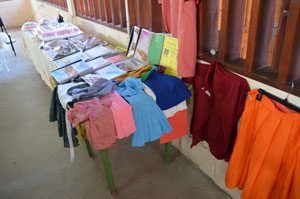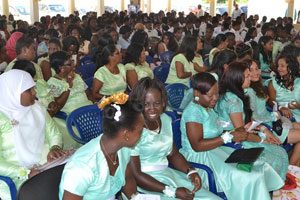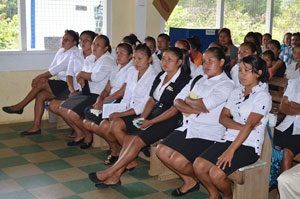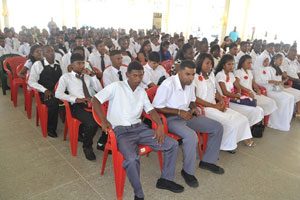“BIT has been a big opportunity for me. It’s a big step for me. I will follow my dream and make a better life for me and for my family.”Those were the words of Reginald Innis, who is today a heavy-duty machine operator after being trained under the Board of Industrial Training (BIT) programme last year.
Although no man is really programmed to fail, many do end up in places of incompleteness and flop. However, no decent government will allow this reality (of missed goals and lost opportunities) to remain the ultimate destiny for those many ‘first-time missers.’ This is where BIT makes a good name for Guyana.

The training provided by BIT, under both the Single Parents Programme and the National Training Project for Youth Empowerment (NTPYE), offers opportunities or “another chance” to improve their skills and marketability.
BIT continues to provide vulnerable individuals with opportunities to gain some form of qualification in technical fields. In this regard, 2,736 persons across the country graduated in 2014, following training in several areas. These persons were trained in various regions and out of these, females numbered 1,469 while males were at 1,267. They were drawn from all the regions, except Region 8 (Potaro/Siparuni).
It also consists of on-the-job training and exposure to life skills, educational classes. The youths targeted are usually between the ages of 15 and 25. Most of them do not have the requisite CSEC qualifications to enter the job market, or may not have completed secondary education.
BIT which has trained more than 8,000 people since its introduction in 2005 was conceived by former President Bharrat Jagdeo and aims at giving unemployed youths a second chance to a secure future. This programme forms part of the fundamental principles of the People’s Progressive Party/Civic (PPP/C) Administration to ensure the equitable access to education by all its citizens.

Many of these BIT students actually left school prematurely and even though this could be considered a waste of free education, these young ones are not abandoned by the Government. The BIT output is all about salvaging young lives, which otherwise might just go astray.
The graduation ceremonies reveal how valuable BIT is, as some of the graduates usually tell of already receiving jobs such as heavy-duty equipment operators, concrete-block makers, caterers and cosmetologists. Many persons also gained skills in the areas of general catering, Information Technology, and Welding and Fabrication.
With Government’s continuing investment of millions of dollars for training skills for young people, inclusive of single parents and mothers, the target focus are those who completed school, but are without any solid academic qualification. This intervention is conducted through BIT programmes which provide opportunities for participants to be empowered with skills. The 2014 graduates have expressed their pleasure at being part of the workforce and to now be able to provide goods and services to their fellow Guyanese to the point of even making some of them entrepreneurs.

Of worthy note is the fact that most of the persons trained thus far are now with jobs in highly skilled areas. For last year, in Region 10 (Upper Demerara/Upper Berbice), 18 persons were trained and have all been placed in jobs. In Region 9 Upper Takutu/Upper Essequibo), for the first time programmes were started, while in Region 7 (Cuyuni/Mazaruni), the heavy-duty equipment operators were trained. The large number of people trained for 2014 represents yet another huge block of youths being invested in.
In Region 2(Pomeroon/Supenaam), 100 were trained; Region 3 Essequibo Islands/West Demerara), 349; Region 4 (Demerara/Mahaica), 641; Region 5

(Mahaica/Berbice)343; Region 6 (East Berbice/Corentyne)there were 907; Region 7, 138; Region 9, 83; and Region 10 there were 175. These all reflect the emphasis placed on those who did not complete school in a satisfactory manner, or those who actually left before finishing. The important thing to note is that these various groups of young people from across Guyana needed to become employable in a meaningful and dignified manner, and BIT came to the fore
At the end of their training, participants were also given specialised kits and so they are now thinking ahead. They are making themselves gainfully employed more and more.
The provision of these skills-courses was seen as the opportunity to not only offer the youths and single parents a second chance, but to give the recipients the opportunity of working for themselves rather than with others.
In addition to the skills-training, the recipients under training under BIT were also exposed to morality teachings and the basics of Mathematics and English. The programme consists of on-the-job training and exposure to life skills educational classes.
(A GINA Feature)



.jpg)








